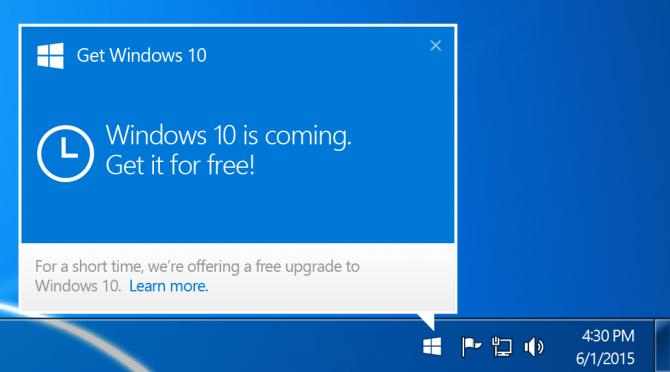Microsoft's tactics to get Windows 7 and Windows 8.1 users to upgrade to Windows 10 went from annoying to downright malicious, according to the Electronic Frontier Foundation in a blogpost. According to the EFF the release of the Windows 10 Anniversary Update is an opportunity to write down their concerns about Windows 10 and how Microsoft doesn't offer users choice and privacy.
The EFF starts with criticizing the way Microsoft tried to convince users to upgrade to Windows 10 by using several tactics that could be considered annoying but according to the EFF, even malicious. As an example the EFF references how Microsoft installed an app on Windows 7 and Windows 8.1 computers that advertised the free upgrade to Windows 10. The app couldn't be easily hidden and removed. After some smart users found ways to block the app, Microsoft created a cat-and-mouse game by adding the app to security patches and by continuously changing it.
Microsoft also pushed Windows 10 through Windows Update, first as a pre-selected download, later as a recommended update so users who opted to automatically download security patches would also automatically download a new operating system without their knowledge.
The EFF continues the blog with several more examples of Microsoft's aggressive marketing of Windows 10 to conclude, "time after time, with each update, Microsoft chose to employ questionable tactics to cause users to download a piece of software that many didn’t want. What users actually wanted didn’t seem to matter."
And the force-feeding of Windows 10 isn't the only concern the EFF has. It also worries about how much data the OS sends back to Microsoft as it writes, "by default, Windows 10 sends an unprecedented amount of usage data back to Microsoft, and the company claims most of it is to “personalize” the software by feeding it to the OS assistant called Cortana. Here’s a non-exhaustive list of data sent back: location data, text input, voice input, touch input, web pages you visit, and telemetry data regarding your general usage of your computer, including which programs you run and for how long."
While the EFF understands that users might find certain features like Cortana useful and understands that development of such features is hard without sending data back to the cloud, it thinks there are many users who would skip these feature in exchange of maintaining their privacy.
Opting out of some settings that send data to Microsoft is possible, but the EFF is worried that there is no guarantee the computer will continue to send data to Microsoft's servers. In the blog the EFF writes about that, "a significant issue is the telemetry data the company receives. While Microsoft insists that it aggregates and anonymizes this data, it hasn’t explained just how it does so. Microsoft also won’t say how long this data is retained, instead providing only general timeframes. Worse yet, unless you’re an enterprise user, no matter what, you have to share at least some of this telemetry data with Microsoft and there’s no way to opt-out of it."
Also Microsoft's explanation that Windows Update won't properly work on Windows 10 systems with telemetry reporting set to the lowest level is criticized. According to the EFF there is no reason why the OS can't updated without sending back telemetry data such a unique IDs or an IMEI number.
That, combined with Microsoft's questionable tactics of adding Windows 10 advertising apps to security updates has lowered the trust of users in the necessity of security updates. Some users therefore no longer install security updates as they are worried what Microsoft adds to their computer. Obviously this means their computer is at risk.
The EFF also provides a solution to Microsoft as it writes, "Microsoft should come clean with its user community. The company needs to acknowledge its missteps and offer real, meaningful opt-outs to the users who want them, preferably in a single unified screen. It also needs to be straightforward in separating security updates from operating system upgrades going forward, and not try to bypass user choice and privacy expectations. Otherwise it will face backlash in the form of individual lawsuits, state attorney general investigations, and government investigations."

















